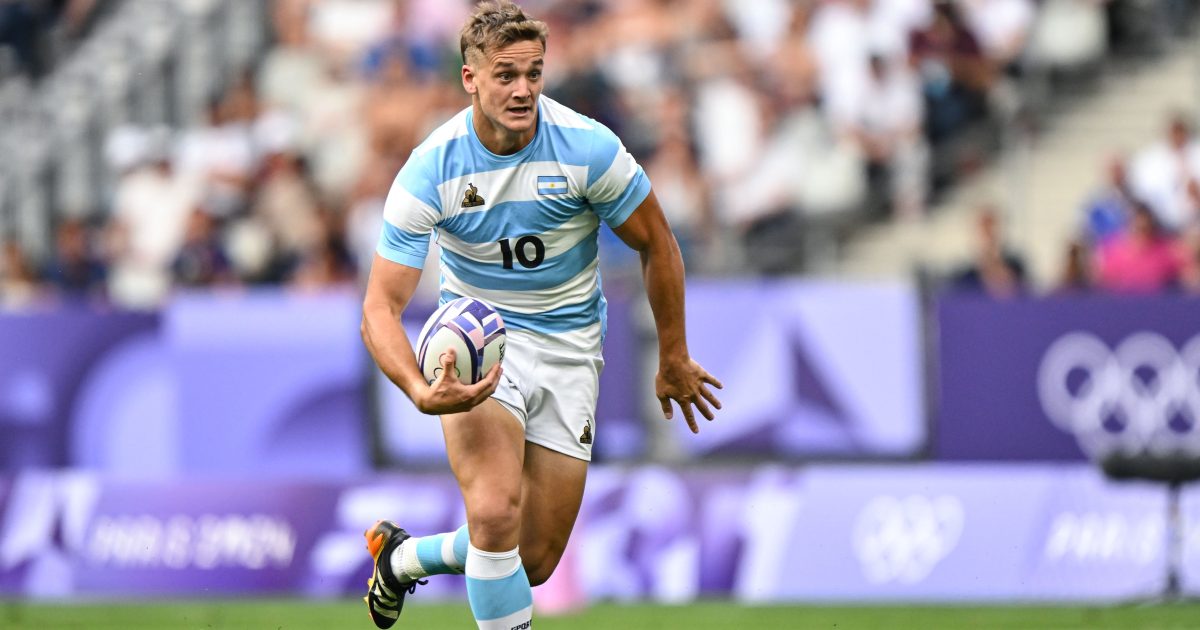Santiago Mare: 'We are the team that everybody wants to beat'

He plays with tons of style. Seeing him pass the ball, run, kick, tackle is pure class. Elegance personified. Santiago Mare, Toto to all, is one of those players who seems to do everything easily.
As Los Pumas 7s skipper post-Olympic Games, his presence on the field has even magnified, growing with the responsibility given to him.
“It is an easy side to lead; everybody knows their role and it makes things very easy,” he opens with pride. It has been a long road for the son of a former player.
“I started playing as soon as I could, around 5 and was a good player at my club, Regatas de Bella Vista, but I was a late bloomer and at around 16, 17, I realized that as I had not developed physically, I needed to learn how to better pass the ball, be smarter, really understand the game. That really helped me in the long run,” he tells RugbyPass, sitting on the small stand overlooking the rugby pitch at Pumas 7s headquarters about 90 minutes north of downtown Buenos Aires, hours away from their next destination: Hong Kong.
The former colony is the first stop in a two-tournament tour that, hopefully, will give Argentina a second consecutive HSBC SVNS title.
Mare’s physical presence grew at around 18 and soon was elevated to the Argentine national set-up playing for the U20s that finished third in Manchester 2016. That team included future sevens teammates Lautaro Bazán Vélez and
Matías Osacdzuk and current Pumas Juan Cruz Mallía, lock Franco Molina and lock/flanker Marcos Kremer.
A year later, he was first selected for Pumas 7s, the first of 39 SVNS tournaments, where he played 210 games and scored 43 tries. London and Paris were the first two stops, whilst still playing XVs for club and Argentina XV, the home-based national team.
The following season, he stayed with sevens. His family’s support has always been huge. With three sisters and a brother (also a rugby player), he was coached from U5 to U19 by his father, a rugby nut, who has travelled with Toto’s mother to SVNS tournaments, the Paris Games and, hopefully, will be in LA next month.
“We are close, he is a great advisor.”
So much, that the Tokyo bronze medal is at his father’s office. The Olympic Games in Los Angeles is a beacon, but still too far away to make any commitments; Mare won’t be drawn into the future so far away. Playing in two Olympic Games was incredible, a third would be dreamy.
Tokyo had its challenges, with empty stadiums and COVID, but “the medal was a reflection of what commitment to playing sevens could bring. Since I joined the team in 2017, the evolution has been noticeable, with players that now are fulltime sevens players.”
Whilst in years gone, beating the likes of Fiji or New Zealand was almost impossible, the sevens revolution made players trust the process.
“When hard work pays off, there is a mysticism. Nowadays, sevens is available live and you feel better, more supported. People recognize you, you are invited to clubs and you can share your story.”
That brings a level of responsibility that has been embraced by Santiago Gómez Cora’s pupils.
In 2021, having arrived from Tokio desperate to enjoy the spoils of his medal, he was on a plane with Los Pumas that were playing the Rugby Championship within less than a working week.
“It was crazy; we were in sanitary bubbles, away for two more months. I even tore a muscle and couldn’t play for Los Pumas.”
Upon returning, he took an offer from Mogliano Venetto, in Italy’s Top 10. The club wasn’t really competitive which confirmed his hunger to achieve things. This break from sevens explains why he is not yet over 50 tournaments for Pumas 7s. He returned, wanting to achieve glory.
It was well-timed, and he was heavily involved last year when Argentina won the HSBC SVNS. His poise, calmness and leadership were crucial, even if the goal of a SVNS double and an Olympic Medal was not achieved.
If anything, it made the team hungrier for this season. After a slow start, they are now in Hong Kong and Singapore hoping to repeat the title.
“It would confirm what we are doing, which is very good.
“We have connection and conviction on the rugby field. By looking at my teammates’ faces I get confidence. We all draw from it.
“We have a job to do over five games on the weekend. And then the following weekend.”
This tour to Asia is much better than a year ago when the tournaments were separated. Argentina flew home from Hong Kong, where they’d lost star Marcos Moneta, with a broken leg, spent a couple of jet-lagged weeks and flew back to Singapore.
“Having both trips back-to-back saves a lot of hassle and travel,” says Mare, who claims that the first opponent is always “travel.”
And then, “we are the team that everybody wants to beat; teams study us much more and it brings more pressure and responsibility, but we embrace it. We’ve been there before and are more mature this year.”
Still hurting from not getting the double at the HSBC SVNS and a second Olympic medal, Argentina hopes to reach its zenith over the next two weekends.
“It would make us very happy.”
As for this next weekend, Hong Kong will open its new stadium. Expectations are huge on both sides of the chalk line. Fans are counting the hours for the turnstiles to open…players are the same.
“Hong Kong is the cradle of sevens. Tradition and history will continue to be part of it as fans fill the stadium, enjoy themselves and hopefully, we will all enjoy the new era.”
News, stats, live rugby and more! Download the new RugbyPass app on the App Store (iOS) and Google Play (Android) now!





































































Vamos Toto, vamos Pumas!!!!